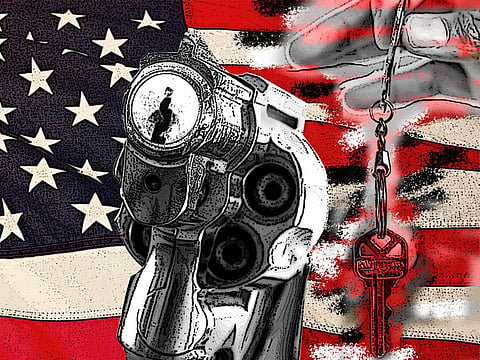US shootings: When will America’s grief end?
78 minutes of pure terror in Uvalde, failed police response, indictment of gun culture

Uvalde, the small town in Texas where 19 grade school students were shot to death by an 18-year-old gunman on May 24, continues to mourn, just as the rest of the nation continues to debate, much in the manner of rider flogging a dead horse, the contradictions found in its gun culture, which mandates the constitutional right, ratified in the Second Amendment, of citizens to “keep and bear arms”, a right that “shall not be infringed”.
The United States, let it be known, is one of three countries in the world, along with Mexico and Guatemala, that gives citizens an inherent right to own guns.
This debate, notorious for being both impassioned and embittered, is unique to America and does not figure in the public discourse of other nations, where the issue of gun rights, gun control, gun laws, gun ownership and the rest of it is of nebulous interest. Let’s face it, mass shootings in the US take place with the regularity of a metronome whereas in other countries they are a rarity.
President Joe Biden, accompanied by the first Lady, travelled to Uvalde on Sunday, a place where immeasurable grief has crept into every home — though grief compounded by outage against the local authorities, who, by their catastrophically slow and inept response to the crisis on that dreadful day, had failed the children.
From coast to coast
The chief executive and his wife were there to console another community in yet another town, in the wake of another massacre in yet another school. The visit came 12 days after the president had travelled to Buffalo, New York, to grieve with families in the wake of a racist shooting of ten Black folks going about their quotidian affairs — shopping for groceries in their neighbourhood supermarket.
At the memorial service, which was held for the victims at the Sacred Heart Catholic Church in midtown Uvalde and attended by the US President and First Lady Jill Biden, a pianist and a violinist played Shubert’s Ava Maria, along with other moving hymns. The archbishop told the audience of 600: “Our hearts are broken”.
How do we quantify the grief felt at the senseless killing of 19 innocent grade school students, along with two teachers? We do not. And we don’t because that kind of grief, whether endured individually by one family or collectively by a whole community, is beyond measure.
Still, kids continue to be slaughtered in their schools in America, from coast to coast, victims of one mass shooting after one mass shooting — all the way from Columbine High School in 1999 (13 killed) to Sandy Hook Elementary School in 2012 (20 children between the ages of six and seven killed), and from Virginia Tech in 2007 (32 killed) to Marjorie Stoneman High School in 2018 (17 killed). And, please, let’s not go through the full list.
Spin it whichever way you want, but at the end of the day the only cause we can attribute to the proliferation of mass shootings in the US — shootings where death is parcelled out randomly, at random times, for random reasons and in random places — is the astronomical proliferation of guns there, plain and simple. You see, the US has a paltry 5 per cent of the population of the world, yet it owns well over 40 per cent of that world’s guns.
Refusing to draw lessons
And let’s not kid ourselves, it is exceedingly unlikely that lawmakers, in federal and state legislatures, will toughen gun rules any time soon. They refused to do that in the wake of previous massacres and there is no reason to hope that they will do it in the wake of Uvalde.
Now contrast that, say, with Canada. On Monday, Prime Minister Trudeau, seizing on the spate of recent shootings in the US, tightened already stringent gun laws, ordering that owners of “assault weapons” should turn them in and imposing new regulations against the “sale, purchase, importation or transfer of handguns” — and this is a country where mass shootings are rare.
“As a government, as a society, we have a responsibility to act to prevent tragedies”, Trudeau told reporters. Gun nuts in America beg to differ.
Many of us who looked at those images of the 19 Uvalde fifth graders on social media — all with fetching smiles on their innocent faces — saw both an indictment of gun culture in America as well as an indictment of the sc*** up society (no other adjective comes to mind here) that those kids were born into, one whose gun laws made it easy for an 18-year-old gunman to walk into a gun store — Texas has eight thousand such stores — and buy a semi-automatic rifle with the impressive ease of someone walking into a grocery store to buy a can of baked beans.
Imagine, America is a country, unlike any other in the developed world, where a parent worries about whether their child will be shot dead in class that day and where grade school kids engage in active-shooter drills, yet a country hesitant — indeed reluctant — to change its gun culture.
It is in America’s power to change its gun laws. It has chosen not to. And we all know where those who make their bed will sleep.
Fawaz Turki is a noted thinker, academic and author based in Washington DC. He is the author of The Disinherited: Journal of a Palestinian Exile
(Update: A gunman killed at least four people Wednesday at a hospital campus in Tulsa, Oklahoma, the latest mass shooting to convulse America coming as Texas families bury their dead after the Texas school massacre. The suspect, who was armed with a rifle and a handgun, was also killed in the attack at the St. Francis Health System hospital campus, police said.)


